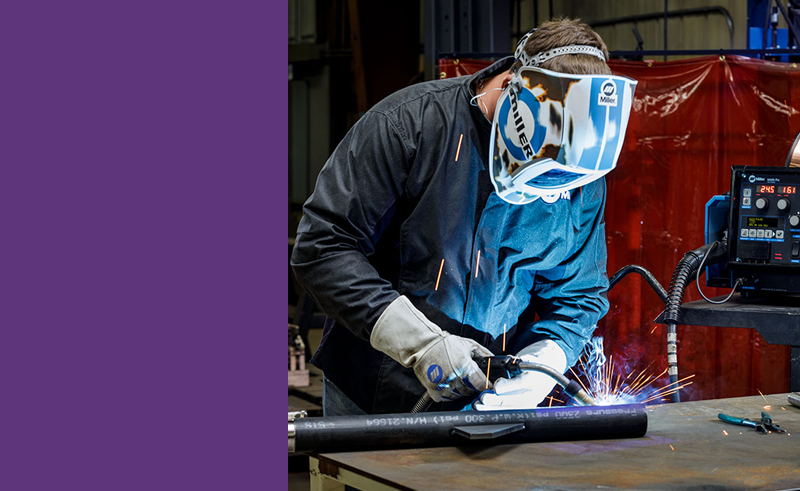Are you looking for a career that is both financially rewarding and offers the potential to create something truly unique? Becoming a welder in Texas might be just what you need. Welding is an incredibly technical and physically demanding profession, but it also provides job security with competitive salaries and plenty of opportunity for growth. This complete guide will take you step-by-step through the process of becoming a certified welder in Texas so that you can start your journey towards a successful welding career.
Page Contents
Researching Welding Programs in Texas
Texas is home to many quality welding programs, offering a wide range of career opportunities for students interested in the trade. Whether you’re looking for an apprenticeship or a full-time job after graduation, there are plenty of options available throughout the state. The best way to research welding programs in Texas is by visiting schools and talking to instructors directly. This will help you get an inside look at what each program has to offer and whether it meets your individual needs. You can also learn more about the types of materials used in classes, as well as safety protocols and industry standards specific to Texas. Additionally, most schools have websites that provide details on course offerings and tuition costs so that you can make an informed decision when selecting a program. In addition to researching welding programs online or through visits, another great resource is professional organizations such as the American Welding Society (AWS). The AWS offers certifications for welders who meet their qualifications, which can be beneficial when searching for jobs after graduation. They also provide helpful resources such as educational seminars and materials about upcoming job openings within the field of welding in Texas. By taking advantage of these resources offered by professional organizations like AWS prior to enrolling in any program, potential students can gain valuable knowledge before making commitment decisions related to their future careers.
Welder education is essential if anyone wants success within this profession; thus researching various welding programs should be done thoroughly – especially if it’s located within Texas! Make sure you do your due diligence when evaluating school curriculum & safety protocols – also take into account tuition fees & other associated expenses before committing yourself financially or otherwise! Taking advantage of helpful resources from professional organizations like AWS prior enrollment will give aspiring welders invaluable insight needed on how they too may succeed down their chosen path!
Applying to a Welder Program in Texas
Texas is home to many exceptional welding programs, offering students the opportunity to gain both theoretical and practical experience in this highly-skilled trade. Whether you’re looking for a career change or already have some welding experience, there are several steps that need to be taken when applying for a welder program in Texas. First, research potential schools and compare their offerings against your individual goals. Consider which types of certifications they offer – such as pipefitting or blueprint reading – and how long it will take you to complete the coursework. Additionally, think about what type of environment each school provides; do they specialize in one specific area? Are there any hands-on courses available? Once you’ve chosen an appropriate program for your needs, contact them directly with questions regarding admissions requirements and application deadlines. Most programs require prospective students to submit proof of high school graduation along with official transcripts from any prior colleges attended. You may also be asked to provide documentation indicating a valid driver’s license or permission from parents/guardians if under 18 years old. After submitting all required documents and fees, wait until accepted into the program before enrolling in classes so that financial aid can be applied properly if needed. Make sure all paperwork is up-to-date so that enrollment doesn’t delay.
Choosing the Right Equipment and Supplies for Welding in Texas
Picking the Right Tools: Welding in Texas can be a very challenging and demanding job, so it is important to make sure that you have the right tools for the job. The first thing to consider when selecting welding equipment is what type of welding you plan on doing. Different types of welding require different types of tools and supplies, such as arc welders, gas welders and MIG welders. You should also think about how often you will be using each tool and if there are any specialized tasks that need to be done with specific equipment.
Getting Quality Supplies: Once you have chosen your equipment, it’s time to select the supplies that are necessary for successful welding jobs in Texas. This includes things like electrodes, fluxes, filler metals and safety gear such as gloves, face shields and respirators. It is important to get quality supplies from reliable sources because these items will help ensure your safety while working with high temperatures or hazardous materials like fumes or sparks. Make sure that all of your supplies meet industry standards for safe use before starting any project.
Completing Required Welding Safety Training Courses in Texas
Texas is a leader in the welding industry, and it’s important for welders to understand the many safety regulations that are necessary to work in this field. In order to ensure that all welders understand these regulations, Texas has several courses available that can provide comprehensive training. These courses cover topics such as proper safety procedures, equipment maintenance, and safety protocols. Additionally, they also provide an overview of welding laws and best practices.
Once a welder completes the required coursework they will need to obtain their certification from the Texas Commission on Environmental Quality (TCEQ). This certification is valid for three years and requires renewal every two years thereafter. To receive their certificate welders must pass both written and practical tests administered by TCEQ-certified instructors who have been trained specifically in welding safety topics & techniques. The tests involve simulations of actual workplace scenarios where students must demonstrate their understanding of safe welding practices within different contexts. After taking these examinations successfully, certified welders may begin working legally within the state of Texas with confidence that they have achieved appropriate standards set forth by regulatory bodies such as TCEQ .
-
- Texas is a leader in the Welding Industry
- Safety Training Courses Available
- Written & Practical Testing Administered
Passing an Exam or Qualifying Test for Welders
Passing the Exam or Qualifying Test
Welding is a dangerous and highly skilled profession, so it is essential that welders are properly trained and certified. To qualify as a welder, an individual must take and pass an exam or qualifying test. This test will assess the individual’s understanding of welding safety requirements, their knowledge of welding principles and procedures, as well as their comprehension of best practices for quality control. The first step to passing any such exam or qualifying test is preparation; this includes studying relevant material related to welding safety regulations, industry standards for quality assurance, proper techniques for setting up welds safely and correctly configuring equipment. Additionally, it can be helpful to practice working with different kinds of metals in order to gain experience in multiple processes prior to taking the actual qualifying test.
Taking the Test
Once ready to take the exam or qualifying test itself, one should arrive early enough at the testing facility on-site (or virtually) if applicable in order to ensure they have plenty of time before beginning the assessment. It can also be beneficial during these moments pre-test to review notes from studying as well as any other related materials which could prove useful when answering questions on subsequent portions of the examination process. When taking part in either an online or physical version of a certification process for welders you’ll likely encounter both written assessments involving multiple choice and/or essay questions along with hands-on practical evaluations designed simulate real world scenarios where accuracy and speed are paramount factors necessary for success. During these types of exams all participants should remain focused while ensuring they follow each instruction provided by administrators carefully while adhering strictly adhere established rules regarding conduct throughout entire duration testing event has been completed without incident violations penalty being assessed against them by those overseeing proceedings..
Salary Expectations for Welders in Texas
Welding is a skill that commands respect and can provide a great career opportunity for those who are willing to put in the time and effort to learn. It’s no wonder, then, that welders in Texas can expect to be rewarded with competitive salaries for their hard work. The average salary of welders in this state has been steadily increasing over recent years as more companies come to realize the important role these individuals play in keeping businesses running smoothly. For starters, it’s important to note that welding jobs vary significantly based on location and experience. Those with extensive training or many years of experience may find themselves making well above the average salary range while entry-level positions may pay slightly less than expected. However, even starting wages tend to be quite reasonable given the required skillset of a welder – particularly when compared with other trades professions. Generally speaking, experienced welders should anticipate earning an hourly wage ranging between $15-$30. This range can depend heavily on both experience level and region; however, most welders will fall somewhere within this spectrum depending on what type of job they have taken up as well as where they live geographically.
-
-
- In larger cities such as Houston or Dallas there is typically higher demand for skilled labor which could lead to increased wages.
- Smaller towns often offer lower wages but may also benefit from having fewer competitors.
-
Ultimately it comes down to finding balance between rate of pay and accessability – something all potential employers should consider before hiring a welder for any project big or small!
Benefits of being a Welder in Texas
Texas is an amazing place to be a welder. The Lone Star State has been experiencing rapid growth in the welding industry, making it a great location for welders who are looking for stability and career opportunities. There are several reasons why being a welder in Texas can lead to amazing benefits:
High Demand
The need for welders in Texas is growing rapidly, with many new projects underway or planned across the state. This means that skilled welders have plenty of job opportunities available to them, whether they’re looking for full-time employment or freelance work. And because there’s such high demand, employers often offer competitive wages and other benefits to attract qualified workers.
Opportunities For Growth
Welding isn’t just about working on one project — it’s also about learning new techniques and expanding your skillset as you go along. In Texas, there are numerous training programs offered by companies and trade schools that allow workers to get certified in different types of welding processes like arc welding or gas tungsten arc welding (GTAW). Having these certifications can open up even more job opportunities down the line. Plus, some companies might even provide tuition assistance if you want to further refine your skillset!
Find Welding Job Opportunities in Texas
Texas has a thriving economy and offers many opportunities for welders to find quality jobs. The Lone Star State is home to some of the largest industries in the United States, including energy, oil and gas, aerospace technology, manufacturing and construction. Texas ranks second nationally in job growth with more than two million new jobs created from 2011-2017. Welding professionals are employed in all these industries as well as many others; therefore there are plenty of welding job opportunities available throughout Texas.
When looking for welding positions it’s important to research which type of welding certifications or qualifications you may need depending on the job you’re seeking. Stick welders typically don’t require certification but those who specialize in aluminum or stainless steel must be certified by an accredited program such as American Welding Society (AWS). Many employers also prefer that applicants have experience working with both thin gauge metals and thicker industrial grade materials. Additionally, safety training courses like Hazardous Materials Awareness Training (HazMat) can be beneficial when applying for certain types of welding positions.
-
-
-
- Texas has a thriving economy
- Welding professionals employed across numerous industries
- Research what type of certifications/qualifications needed
- Experience working with thin gauge metals & thicker industrial grade materials.
-
-
Conclusion: Becoming a Welder in Texas, is it Worth it?
Becoming a welder in Texas is an exciting and rewarding career path. It requires dedication, hard work and knowledge of the trade. A successful welder must have a good eye for detail, be able to follow safety protocols and be willing to put in long hours of practice. With the right training program and certifications, anyone can become a skilled welder in Texas. Taking advantage of online courses as well as hands-on experience will give aspiring welders all they need to excel at this profession. With determination, skill development and commitment, becoming a welder in Texas is achievable!





